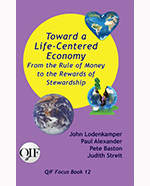Each quarter, we share the latest sharing-related books we’re reading. As usual, these are books that are either new, or new to us, and we are thrilled to share them with you. Take a look at what we’ll be reading and let us know what you think. This edition of the round up also includes our free version of our new ebook “Community Solutions to the Loneliness Epidemic.” Download your copy now.
If you have ideas for other books we should check out, let us know at info@shareable.net.
Below are summaries, excerpted from each book’s website:
 Community Solutions to the Loneliness Epidemic by Shareable
Community Solutions to the Loneliness Epidemic by Shareable
“For the first installment of Shareable’s new editorial series, we asked the question, “how can we respond as a community to reduce loneliness and social isolation?” We go beyond typical approaches to look at how civic engagement, the solidarity economy, public space, housing, sharing projects, and other social innovations can help reweave the social fabric.”
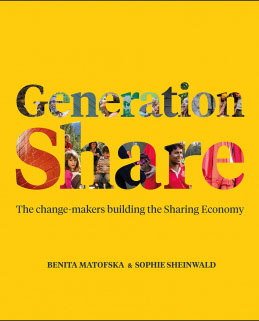 Generation Share: The change-makers building the Sharing Economy by Benita Matofska
Generation Share: The change-makers building the Sharing Economy by Benita Matofska
“Generation Share takes readers on a journey around the globe to meet the people who are changing and saving lives by building a Sharing Economy. Through stunning photography, social commentary and interviews with 200 change-makers, Generation Share showcases extraordinary stories demonstrating the power of Sharing. From the woman transforming the lives of slum girls in India, to the UK entrepreneur who has started a food sharing revolution; you’ll discover the creators of a life-saving human milk bank, a trust cafe and a fashion library who are changing the world.”
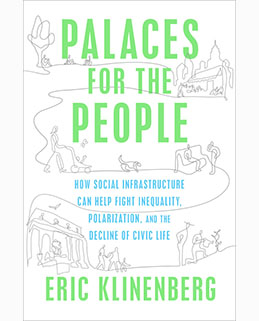 Palaces for the People: How social infrastructure can help fight inequality , polarization and the decline of civic life by Eric Klinenberg
Palaces for the People: How social infrastructure can help fight inequality , polarization and the decline of civic life by Eric Klinenberg
“We are living in a time of deep divisions. Americans are sorting themselves along racial, religious, and cultural lines, leading to a level of polarization that the country hasn’t seen since the Civil War. Pundits and politicians are calling for us to come together and find common purpose. But how, exactly, can this be done?
In Palaces for the People, Eric Klinenberg suggests a way forward. He believes that the future of democratic societies rests not simply on shared values but on shared spaces: the libraries, childcare centers, churches, and parks where crucial connections are formed. Interweaving his own research with examples from around the globe, Klinenberg shows how “social infrastructure” is helping to solve some of our most pressing societal challenges. Richly reported and ultimately uplifting, Palaces for the People offers a blueprint for bridging our seemingly unbridgeable divides.”
 Urban Food Sharing : Rules, tools and networks by Anna R. Davies
Urban Food Sharing : Rules, tools and networks by Anna R. Davies
“This book explores the history and current practice of food sharing. Illustrated by rich case studies from around the world, the book uses new empirical data to set an agenda for research and action. The book will be an important resource for researchers, policy makers and sharing innovators to explore the impacts and sustainability potential of such sharing for cities.”
 Human Archipelago by photographer Fazal Sheikh and writer Teju Cole
Human Archipelago by photographer Fazal Sheikh and writer Teju Cole
“For the past 25 years Fazal Sheikh has highlighted the plight of displaced people and refugees around the world. He has photographed people driven from their homes by war as well as those upended by the redrawing of national borders and the reassertion of racial and ethnic divisions. Sheikh has also made sublime photographs of landscapes altered by political and environmental crises.
In the past two years, the shift to the political right in the US has been replicated across Europe, the Middle East, Central and East Africa and Southeast Asia, as authoritarian governments and xenophobia have increased. As an act of refusal to these political trends, Sheikh sought out the celebrated novelist and critic Teju Cole for a collaboration that would reinforce their commitment to the ideal of a compassionate global community as well as the importance of individual courage.
The resulting book represents the two authors’ distinct visions, their shared values and mutual spirit of cooperation. With Cole’s words and Sheikh’s photos we are confronted with fundamental and newly necessary questions of co-existence: who is my neighbor? Who is kin to me? Who is a stranger? What does it mean to be human?”
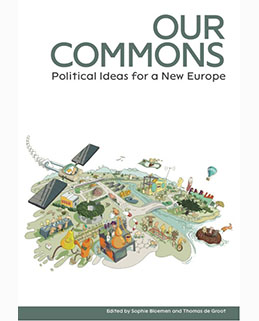 Our Commons: Political Ideas for a New Europe Edited by Sophie Bloemen and Thomas de Groot
Our Commons: Political Ideas for a New Europe Edited by Sophie Bloemen and Thomas de Groot
“Our Commons: Political Ideas for a New Europe is a collection of essays, case studies and interviews about the commons, published right before the European Elections of May 2019. The book showcases the wealth of transformative ideas that the international commons movement has to offer. With contributions by Kate Raworth, David Bollier, George Monbiot and many others, Our Commons is a political call to arms to all Europeans to embrace the commons and build a new Europe.”
 Banking on the People: Democratizing Money in the Digital Age by Ellen Brown
Banking on the People: Democratizing Money in the Digital Age by Ellen Brown
“Today most of our money is created, not by governments, but by banks when they make loans. This book takes the reader step by step through the sausage factory of modern money creation, explores improvements made possible by advances in digital technology, and proposes upgrades that could transform our outmoded nineteenth century system into one that is democratic, sustainable, and serves the needs of the twenty-first century. Ellen Brown is the founder and chairman of the Public Banking Institute and a Fellow at The Democracy Collaborative.”
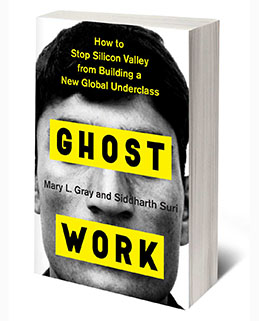 Ghost Work: How to stop Silicon Valley from building a new global underclass by Mary L. Gray and Siddharth Suri
Ghost Work: How to stop Silicon Valley from building a new global underclass by Mary L. Gray and Siddharth Suri
“Hidden beneath the surface of the web, lost in our wrong-headed debates about AI, a new menace is looming. Anthropologist Mary L. Gray and computer scientist Siddharth Suri team up to unveil how services delivered by companies like Amazon, Google, Microsoft, and Uber can only function smoothly thanks to the judgment and experience of a vast, invisible human labor force. These people doing “ghost work” make the internet seem smart. They perform high-tech piecework: flagging X-rated content, proofreading, designing engine parts, and much more. An estimated 8 percent of Americans have worked at least once in this “ghost economy,” and that number is growing. They usually earn less than legal minimums for traditional work, they have no health benefits, and they can be fired at any time for any reason, or none.
There are no labor laws to govern this kind of work, and these latter-day assembly lines draw in—and all too often overwork and underpay—a surprisingly diverse range of workers: harried young mothers, professionals forced into early retirement, recent grads who can’t get a toehold on the traditional employment ladder, and minorities shut out of the jobs they want. Gray and Suri also show how ghost workers, employers, and society at large can ensure that this new kind of work creates opportunity—rather than misery—for those who do it.”
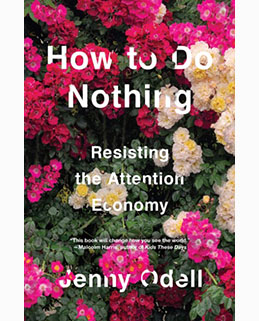 How to do nothing: Resisting the attention economy by Jenny Odell
How to do nothing: Resisting the attention economy by Jenny Odell
Read our Q&A with author Jenny Odell
“A galvanizing critique of the forces vying for our attention—and our personal information—that redefines what we think of as productivity, reconnects us with the environment, and reveals all that we’ve been too distracted to see about ourselves and our world. Nothing is harder to do these days than nothing. But in a world where our value is determined by our 24/7 data productivity . . . doing nothing may be our most important form of resistance.
So argues artist and critic Jenny Odell in this field guide to doing nothing (at least as capitalism defines it). Odell sees our attention as the most precious—and overdrawn—resource we have. Once we can start paying a new kind of attention, she writes, we can undertake bolder forms of political action, reimagine humankind’s role in the environment, and arrive at more meaningful understandings of happiness and progress.”
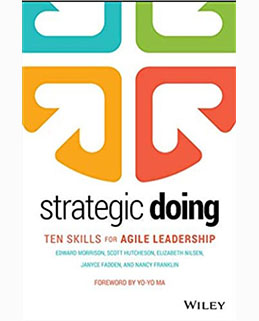 Strategic Doing: Ten Skills for Agile Leadership by Edward Morrison, Elizabeth Nilsen, Janyce Fadden, Nancy Franklin, and Scott Hutcheson
Strategic Doing: Ten Skills for Agile Leadership by Edward Morrison, Elizabeth Nilsen, Janyce Fadden, Nancy Franklin, and Scott Hutcheson
“Our companies, our communities, and our planet are facing unprecedented challenges – challenges that will not be solved by a small group of people from a single entity. Today’s leaders need a set of tools specifically designed to harness the power of collaborative networks.
Strategic Doing introduces you to the new disciplines of agile strategy and collaborative leadership. You’ll learn how to design and guide complex collaborations by following a discipline of simple rules that you won’t find anywhere else.”
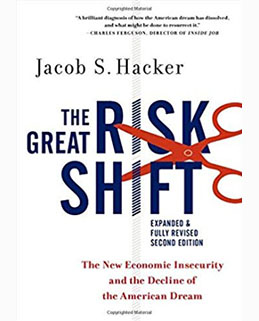 The Great Risk Shift: The New Economic Insecurity and the Decline of the American Dream, Second Edition by Jacob S. Hacker
The Great Risk Shift: The New Economic Insecurity and the Decline of the American Dream, Second Edition by Jacob S. Hacker
“On the eve of the financial crisis, Jacob S. Hacker wrote “the policy book of the year” (E.J. Dionne, Jr., Washington Post), demonstrating and explaining the hidden story of growing economic insecurity. In this fully revised and updated second edition, he brings his powerful exposé of “The Great Risk Shift” up to date with startling new evidence and compelling new ideas. Hacker shows that the safety net was unraveling long before the late-2000s, as more and more economic risk shifted from the broad shoulders of government and business onto the fragile backs of American families.
Whether the problem is risky jobs brought on by corporate restructuring and the “gig economy” of contingent work, risky families created by the rising costs and instabilities of parenthood, risky retirement caused by the collapse of traditional guaranteed pensions, or risky health care fueled by skyrocketing costs and unstable coverage-Hacker shows what has changed and why, the ways in which ordinary Americans have been affected, and how we can fight back. Behind the risk shift, he contends, is the “Personal Responsibility Crusade” eagerly embraced by corporate leaders and conservative politicians who speak of an economic nirvana in which Americans are free to choose. But the result, Hacker reveals, has been very different: a harsh new world of economic insecurity in which far too many Americans are allowed to fall behind. Blending powerful human stories, big-picture analysis, and compelling ideas for reform, this remarkable volume has become a rallying point in the struggle for economic security in an increasingly uncertain world.”
 Share Life: Dive into a new life of sharing economy (Japanese) by Anju Ishiyama
Share Life: Dive into a new life of sharing economy (Japanese) by Anju Ishiyama
“Japanese social innovator and sharing advocate Anju Ishiyama shares her insights about her impressively thorough sharing lifestyle and the potential of this way of living to address the major challenges facing Japan. Ishiyama is a credible authority on this not only because of her lifestyle, but her years of public advocacy for sharing in Japan through the Sharing Economy Association of Japan, which has elevated the idea, practice, and policy of sharing in her home country with admirable success. The book is in Japanese, but an English version may be in the works.”
 Governing the wind energy commons: Renewable energy and community development by Keith A. Taylor
Governing the wind energy commons: Renewable energy and community development by Keith A. Taylor
“Wind energy is often framed as a factor in rural economic development, an element of the emerging “green economy” destined to upset the dominant greenhouse- gas-emitting energy industry and deliver conscious capitalism to host communities. The bulk of wind energy firms, however, are subsidiaries of the same fossil fuel companies that wrought havoc in shale-gas and coal-mining towns from rural Appalachia to the Great Plains. On its own, wind energy development does not automatically translate into community development.
In Governing the Wind Energy Commons, Keith Taylor asks whether revenue generated by wind power can be put to community well-being rather than corporate profit. He looks to the promising example of rural electric cooperatives, owned and governed by the 42 million Americans they serve, which generate $40 billion in annual revenue. Through case studies of a North Dakota wind energy cooperative and an investor-owned wind farm in Illinois, Taylor examines how regulatory and social forces are shaping this emerging energy sector. He draws on interviews with local residents to assess strategies for tipping the balance of power away from absentee-owned utilities.”
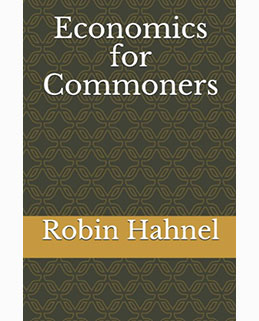 Economics for commoners by Robin Hahnel
Economics for commoners by Robin Hahnel
“In a world where so many obfuscate, distort, and misrepresent economic argument for venal purposes, citizens are wise to arm themselves with basic economic literacy to avoid being cowed or misled. This short book, written by an economics professor who taught for forty years at universities in the United States, Europe, and Latin America, provides a relatively painless immunization. Economics for Commoners distills economic wisdom down to its most essential insights, requires no prior economic training, and no math beyond high school algebra. Six chapters in part one explain how prices, wages, profits, and rents are determined, how government fiscal and monetary policy work, and what money, banks, and finance are all about. Three chapters in part two explain how to evaluate economic performance: Is our labor being used efficiently? Are we adequately protecting the natural environment? Are the burdens and benefits of economic activity being distributed fairly?”
Toward a Life-Centered Economy by John Lodenkamper, Paul Alexander, Pete Baston, and Judith Streit
“Toward a Life-Centered Economy: From the Rule of Money to the Rewards of Stewardship shows how we as consumers and investors could shift the marketplace toward sustainable, non-polluting products and promote geographic re-localization. Economic synergism will give all the stakeholders a place at the table: labor, management, shareholders, customers, suppliers, community, and, most especially, Earth’s ecosystems.”


